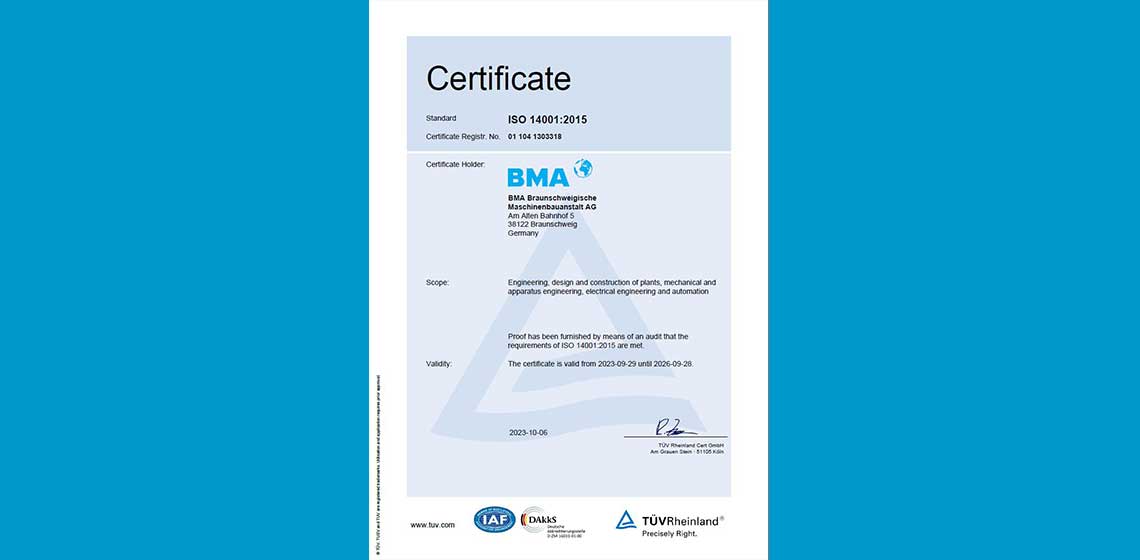With the ISO 14001 certification of its environmental management system, BMA is setting new standards in climate and environmental protection. In this interview, Emilia Waldow, in charge of the integrated management system at BMA, and Dr. Ralf Utermöhlen, managing director of AGIMUS GmbH, explain objectives and actions. They also discuss what impact the focus on sustainability will have on BMA’s product portfolio.

BMA: commitment to comprehensive sustainability
Environmental management system certified – carbon footprint to be reduced by 4.2 % per year
Ms Waldow, what reasons did BMA have for introducing an environmental management system?
Emilia Waldow: BMA has always been very much committed to sustainability. Our environmental management system was a logical next step for us, to intensify and strengthen our efforts. It helps us set clear goals and also ensures that our actions are effective and have a visible positive impact on the environment. The certificate fits in perfectly with our integrated management system, which already includes quality management, energy management, and occupational health and safety.
Dr. Utermöhlen, what is the focus of AGIMUS’s work?
Ralf Utermöhlen: At AGIMUS, our key areas of competence are energy, the environment, safety at work, and the development of management systems. Sustainability takes priority in all our services. Back in 1991, when we founded AGIMUS, we were confident that environmental protection would continue to grow in importance for companies – and we have been proved right. At BMA, we provided assistance in setting up an environmental management system according to ISO 14001.
How did AGIMUS implement the environmental management system at BMA?
Ralf Utermöhlen: We started with a review of all activities at the site that could have environmental aspects. Based on this, we rated elements such as the use of resources or waste disposal, in order to identify potential for improvement. We then set up the system: we defined clear environmental objectives for BMA, assigned responsibilities, and set deadlines. One key aspect in this was to ensure transparency in all processes and to strengthen the knowledge of all those involved through training.
How has BMA changed over the past years in terms of sustainability and energy efficiency?
Emilia Waldow: Since the introduction of our energy management system in 2015, we have set ourselves an annual goal of reducing energy consumption at BMA by two percent from the set baseline – and we have achieved it. With our new ISO 14001 certificate, we will intensify our efforts in protecting the environment. Our next major goal is to reduce our carbon footprint by 4.2 percent annually.
What is BMA doing to achieve this goal?
Emilia Waldow: There are everyday actions that anyone at BMA can help with straightaway, such as closing windows while the heating is on, or switching off the lights when they are not needed. These actions are just as important for us as bigger steps.
What structural changes is BMA planning?
Emilia Waldow: One major step is the switch to LED lights. We are also always trying to find more ways of relying on renewable energy – from the use of solar power to developing e-mobility. ISO 14001 provides a framework for us to systematically consider and implement actions like these. Another objective, which concerns compliance, is to ensure transparency and openness, both key elements of an effective integrated management system.
Could you give examples of specific contributions to sustainability made by products and services from BMA?
Emilia Waldow: One excellent example is our digital platform 'smart4sugar'. It allows our customers to analyse their sugar process in terms of energy consumption and in many cases to make the necessary adjustments and changes in their plant. Sometimes there is then no need for a BMA engineer to travel to the site, which significantly reduces CO2 emissions.
How does BMA use customer feedback on products for improvements in the areas energy efficiency and sustainability?
Emilia Waldow: We very much value information about our customers’ experiences with plants and equipment from BMA. Their feedback is vital, so we can continue to make our products more energy-efficient and sustainable. Thanks to our close collaboration with customers, we have in the past always been able to achieve improvements in these areas.
Ralf Utermöhlen: The correct planning and configuration of a plant are crucial. With the purchase of a plant, a customer determines the use of resources over the ten years that follow. So, if BMA designs a plant that is just two percent more energy-efficient than the previous model, that will save the customer many millions of kilowatt hours in energy over its lifecycle. It represents a huge contribution to environmental protection and at the same time significant cost savings for the operator.
Ms Waldow, what personal insights have you gained in your development of the environmental management system and in making concrete plans for sustainability at BMA?
Emilia Waldow: Good teamwork was crucial to the success of this project and made it very special. Within BMA and together with other companies, we are working hand in hand for a mission whose impact goes far beyond BMA. It is an investment in the future, which we would like to make just a little bit better.
